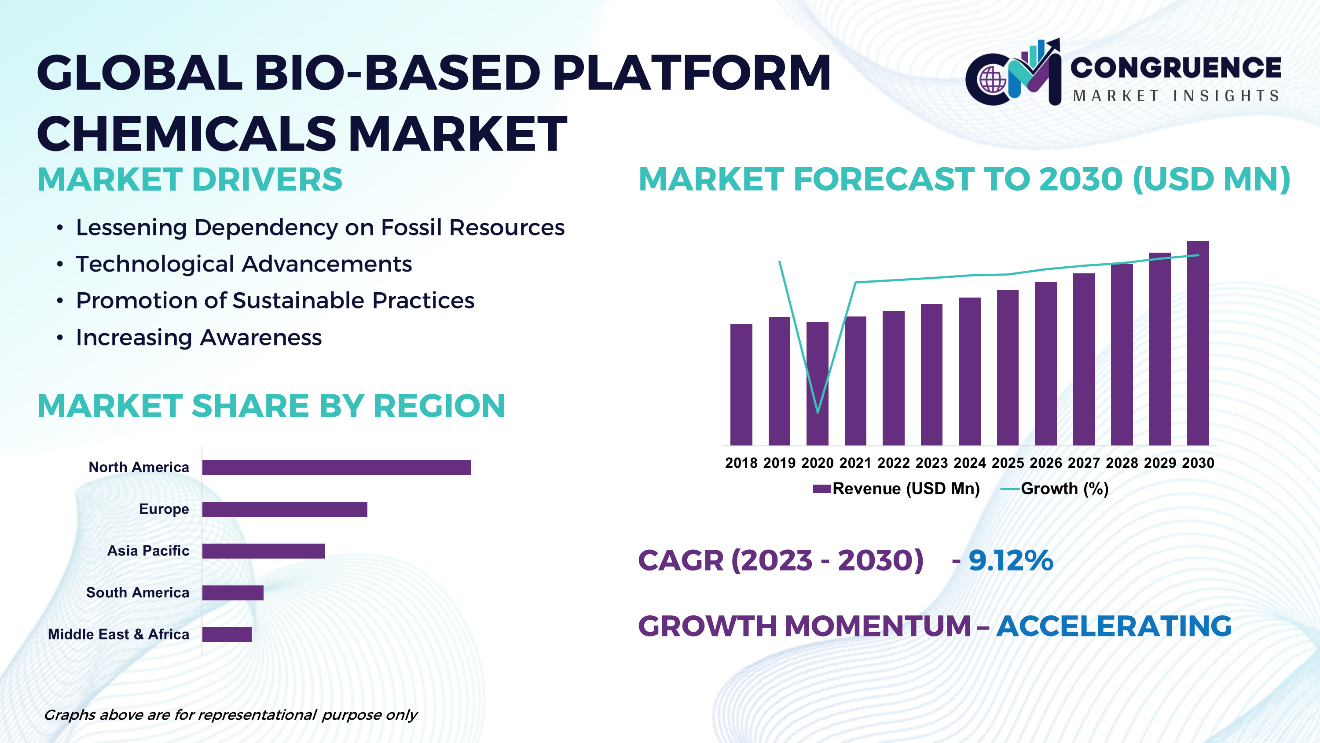Reports
The Global Bio-based Platform Chemicals Market is expected to expand at a CAGR of 9.12% between 2023 and 2030. Bio-based platform chemicals play a pivotal role in promoting sustainable industrial processes, signaling a transition towards eco-conscious methods. Utilizing advancements in biotechnology, these chemicals are sourced from renewable reservoirs such as biomass, presenting a more environmentally sustainable option compared to traditional petrochemicals. Innovations in microbial fermentation, enzymatic procedures, and metabolic engineering have facilitated the efficient manufacturing of bio-based platform chemicals. This eco-friendly approach not only diminishes reliance on fossil fuels but also addresses ecological concerns, aligning with the global trend towards a circular bioeconomy. The market has experienced notable advancements, with a focus on scalable production, cost competitiveness, and diversification of application areas. The industry landscape is characterized by strategic partnerships, ongoing research endeavors, and increased investments, underscoring the escalating significance of bio-based platform chemicals in sustainable and economically viable industrial practices.

Bio-based Platform Chemicals Market Major Driving Forces
Lessening Dependency on Fossil Resources: The necessity to diminish reliance on finite fossil fuels acts as a catalyst, prompting industries to explore and integrate bio-based alternatives.
Technological Advancements: Ongoing innovations in biotechnology, encompassing microbial fermentation and metabolic engineering, improve the efficiency of bio-based chemical production and diversify the product range.
Promotion of Sustainable Practices: The rising emphasis on sustainability in industries fuels the demand for bio-based platform chemicals sourced from renewable biomass, contributing to reduced environmental impact.
Increasing Awareness: Growing awareness within industries regarding the benefits of circular bioeconomies and the imperative to lessen dependence on fossil fuels drive the adoption of eco-friendly alternatives.
Bio-based Platform Chemicals Market Key Opportunities
Sustainable Agriculture Solutions: Bio-based platform chemicals uniquely provide sustainable alternatives for fertilizers, pesticides, and soil conditioners, offering distinctive eco-friendly solutions for modern agriculture.
Revolutionizing Green Energy: In a distinctive move, bio-based chemicals redefine green energy by reducing reliance on fossil fuels, carving a unique path toward a cleaner and more sustainable energy future.
Circular Bioeconomy Pioneering: Uniquely positioned, bio-based platform chemicals lead the way in circular bioeconomy development, spearheading the transformation of waste materials into valuable resources for sustainable and circular economic practices.
Biodegradable Plastics Innovation: Bio-based platform chemicals offer an exceptional avenue to tackle issues related to plastic pollution by producing biodegradable plastics. This transformative approach reshapes the realm of sustainable packaging materials, providing a distinctive solution to environmental concerns.
Bio-based Platform Chemicals Market Key Trends
· The global shift towards circular economies is evident in the increasing adoption of bio-based platform chemicals, emphasizing sustainability and efficient resource utilization.
· Ongoing innovations in biotechnology, incorporating genetic engineering and synthetic biology, propel the development of more diverse and efficient bio-based platform chemicals, expanding their range of applications.
· Driven by a demand for eco-friendly packaging, bio-based platform chemicals play a crucial role in producing sustainable and biodegradable packaging materials.
· Government support and regulatory initiatives, including incentives and mandates, shape the market dynamics, encouraging industry players to invest in sustainable practices.
· Collaboration among industry stakeholders, research institutions, and governments fosters innovation, accelerates research, and facilitates the commercialization of bio-based platform chemicals.
· Bio-based platform chemicals, diversifying their applications, find new roles across industries, contributing to a more sustainable and adaptable chemical market.
· Increasing consumer awareness about environmental issues propels a shift towards eco-friendly products, prompting manufacturers to integrate bio-based platform chemicals.
· The convergence of advanced technologies, such as biotechnology, nanotechnology, and data analytics, enhances the efficiency and precision of bio-based platform chemical production.
· Growing interest in waste valorization practices, utilizing bio-based platform chemicals from organic waste, aligns with sustainability goals.
· A focus on the economic viability of bio-based platform chemicals drives research efforts to enhance their commercial attractiveness.

Market Competition Landscape
The bio-based platform chemicals market showcases intense competition among industry leaders and innovative startups. Established companies leverage their technological prowess, while startups introduce disruptive solutions. Collaborations and strategic partnerships are prevalent, driving innovation. The landscape is dynamic, marked by continuous advancements, research initiatives, and a focus on sustainable practices, shaping the competitive environment in the evolving bio-based platform chemicals sector.
Key players in the global Bio-based Platform Chemicals market implement various organic and inorganic strategies to strengthen and improve their market positioning. Prominent players in the market include:
· BASF
· Cargill, Incorporated
· DSM
· INEOS
· Dow
· Evonik
· Braskem
· Corbion
· AVA Biochem AG
· Roquette Frères
· Pyran
· GFbio
|
Report Attribute/Metric |
Details |
|
Base Year |
2022 |
|
Forecast Period |
2023 – 2030 |
|
Historical Data |
2018 to 2022 |
|
Forecast Unit |
Value (US$ Mn) |
|
Key Report Deliverable |
Revenue Forecast, Growth Trends, Market Dynamics, Segmental Overview, Regional and Country-wise Analysis, Competition Landscape |
|
Segments Covered |
· By Chemical Type (Bio-based Acids, Bio-based Alcohols, and Bio-based C3-C6 Chemicals) · By Production Process (Fermentation-based, and Chemical Synthesis) · By Application (Biofuels, Chemical Intermediates, and Polymers) · By End Use Industry (Packaging, Automotive, Textile, and Others) |
|
Geographies Covered |
North America: U.S., Canada and Mexico Europe: Germany, France, U.K., Italy, Spain, and Rest of Europe Asia Pacific: China, India, Japan, South Korea, Southeast Asia, and Rest of Asia Pacific South America: Brazil, Argentina, and Rest of Latin America Middle East & Africa: GCC Countries, South Africa, and Rest of Middle East & Africa |
|
Key Players Analyzed |
BASF, Cargill, Incorporated, DSM, INEOS, Dow, Evonik, Braskem, Corbion, AVA Biochem AG, Roquette Frères, Pyran, GFbio, and Others |
|
Customization & Pricing |
Available on Request (10% Customization is Free) |
